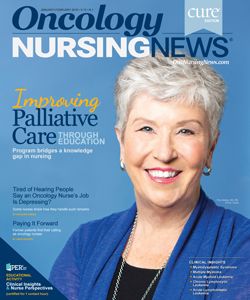Learning the Hard Way
A hospice nurse shows me what a “good death” could look like.
There is an old proverb I’ve heard many times, attributed to several sources: “When the student is ready, the teacher will appear.” Although I was anything but ready to face the concepts of death and dying, in 1990, my teacher appeared. He was 59 years old and presented to the emergency department with sudden onset nausea and vomiting, along with a severe headache. I vividly remember standing outside the thin curtain separating his stretcher from where I stood, dumbfounded, as the doctor introduced the words “temporal mass” and “cerebral edema” into my life.
I wasn’t a nurse then. I was a mother to 2 young girls, and I was not prepared to take care of the man behind the curtain. He was the greatest man I had ever known, the same man whom I would forever refer to as my first patient. My father. His diagnosis was an aggressive glioblastoma, and he lived 9 months from that day. I was forced into a crash course on surgery, radiation therapy, and end-of-life care. His final 2 months were spent in my home. The man who defined a “good day” as 18 holes on a golf course was now confined to a hospital bed in my guest bedroom, wearing diapers.
My family came together with the best of intentions, but we never quite had the conversations we needed to have. Some family members refused to acknowledge he was dying, and others viewed hospice care as giving up. Some did not want to treat his pain with narcotics for fear he would become addicted. I was desperate to find anyone who could help me ensure that my father would not suffer, which finally led me to call the hospice answering service—and brought another teacher in to my life.
The hospice nurse returned my call later that evening. Nothing could have prepared me for the way it felt to feel so completely heard and understood in the midst of that terrifying time. She listened to my concerns, fears, and confusion. She became my lifeline and helped my family to have the difficult conversations exploring what a “good death” could look like and what my father would want.
These lessons started me on the path I still walk today, that of an oncology nurse who advocates for quality cancer care throughout the healthcare continuum. Caring for my father opened my eyes to what was missing and I believe is still lacking today: effective palliative care.
Palliative care addresses not only symptom management but also the emotional devastation that affects both patients and their families. Today, research shows that when palliative care is integrated earlier in the disease process, outcomes improve.1 Our ability to achieve better outcomes lies in how we engage in difficult conversations. This includes an understanding of what quality of life is and, most importantly, what it means to the patient.
Nursing continues to be ranked as the most trusted profession. It should not be a surprise, as many of us are able to share a sacred space the moment we enter into the darkness with our patients. Having difficult conversations is more effective when empathy is included. Theresa Wiseman, RGN, BSc(Hons) Psych, RCNT, RNT, PGDE, a nursing researcher and scholar at the University of Southampton in the United Kingdom, says that although providing empathy is not always easy, it is a skill that can be mastered.2 It requires that we:
1. See the world as others see it
2. Be nonjudgmental
3. Understand another person’s feelings
4. Communicate understanding of what was shared
Brene Brown, PhD, LMSW, a research professor at the University of Houston Graduate School of Social Work, says empathy reminds us that we are not alone. Her research focuses on authentic leadership and the healing power of listening while allowing someone to feel they are truly heard and valued. She speaks to the basic elements of what we need to master if we, as nurses and human beings, hope to provide compassionate, empathetic care. Understanding our own vulnerabilities is a critical first step.3 Our ability to foster difficult conversations can be instrumental to breaking through feelings of isolation and loneliness that our patients and families face. This can be hard work. By acknowledging the difficulty, we take the first step toward meeting them where they are.
We may not always be ready when our teachers appear. However, I have found that when I seek to learn and enhance my ability to be there for others, I’m surrounded by many experts. I’ve lost count of the number of teachers I have been grateful to meet along the way. My teachers include nursing colleagues, physicians, researchers, and especially patients who have trusted me with their deepest thoughts. I use every opportunity I can now to urge nurses to always remember the reasons they chose this career and to remember their teachers. I urge them to never stop learning.
Jean Sellers is an administrative clinical director at UNC Lineberger Comprehensive Cancer Center in Chapel Hill, North Carolina.

Innovative Program Reduces Nurse Turnover and Fosters Development
Published: September 12th 2024 | Updated: September 12th 2024The US Oncology Network (The Network) has developed one of the most comprehensive programs in the nation to support the professional development and retention of new oncology nurses.


